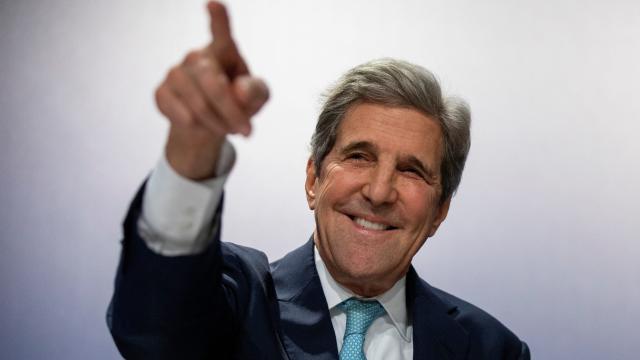President-elect Joe Biden has chosen John Kerry to be his international climate czar. In the role, formally called the special presidential envoy on climate, Kerry will coordinate interagency programs in the White House. He’ll also be embedded in the National Securities Council — which advises the president on national security, the military, and foreign policy — marking the first time that a climate-focused official will sit on the council.
“America will soon have a government that treats the climate crisis as the urgent national security threat it is,” Kerry tweeted shortly after the move was announced.
Kerry is right that climate change is an urgent threat to the safety of Americans and the global population. Climate disasters displace millions of people each year, and also exacerbate existing tensions, which can lead to violent conflict. He’s also had experience brokering international climate deals, notably playing a key role in the 2015 Paris Agreement. But in his new position, Kerry could promote the expansion of dirty energy in the name of U.S. energy dominance, rather than pushing for a global planned decline.
“There’s a real danger in viewing climate as just another pawn in the militaristic national security game without proper guardrails,” Collin Rees, campaigner with Oil Change International, said in a text message. “Using the pretext of climate to boost U.S. gas and oil interests abroad — as we saw from Kerry [and] others during the Obama era — gets it precisely wrong.”
As Secretary of State during President Barack Obama’s second term, for instance, Kerry was a champion of the massive expansion of oil and gas in the U.S., largely due to the fracking boom.
“Many people remember that he took the decision in 2016 to reject the Keystone XL pipeline as not in the national interest, but Kerry and Kerry’s State Department were simultaneously heralding the fact that oil shale and fracking were creating a new energy era for the U.S.,” Carrol Muffett, president of the Centre for International Environmental Law, said.
[referenced id=”1532147″ url=”https://gizmodo.com.au/2020/11/ivanka-boldly-highlights-trump-administrations-big-pandemic-success/” thumb=”https://gizmodo.com.au/wp-content/uploads/2020/11/25/saycalceehtudycprluk-300×169.jpg” title=”Ivanka Boldly Highlights Trump Administration’s Big Pandemic Success” excerpt=”Finally, we are getting some FACTS out of the White House. Noted environmentalist and nepotistic grifter Ivanka Trump dropped some KNOWLEDGE on Twitter on Tuesday.”]
Thanks to the surge in domestic production and Obama’s repeal of the 40-year crude oil export ban in 2016, the U.S. began to ship millions of barrels of domestically produced crude oil per day overseas. By 2019, the U.S. even briefly overtook Saudi Arabia as the top exporter of crude oil in the world.
In the Obama administration, Kerry also supported the spread of American fossil fuel drilling technologies. He backed a project known as the Caribbean Energy Security Initiative, run by then-vice president Biden, which aimed to help Caribbean nations expand their drilling capacities. And in the State Department, Kerry oversaw the Unconventional Gas Technical Engagement Program, a project designed to export American fracking techniques to other countries, including Canada, Argentina, and China.
“We’re still dealing with the cleanup from that in places like Vaca Muerta in Argentina,” said Muffett, referring to a region that became home to one of the largest shale extraction projects in the world thanks to the introduction of American-style fracking. “We can’t afford to see the continuation of this idea that we can keep expanding dead-end fossil fuels.”
Since then, the science of the climate crisis has become even more urgent. But while Kerry has clearly demonstrated that he’s no climate denier, he has not shown that he’s ready to fight for an end to fossil fuels. With his climate coalition, World War Zero, he’s eschewed taking positions on specific and varying proposals from the Green New Deal and carbon taxes, instead focusing instead on the need to start “having conversations.” And just last year, Kerry encouraged Vietnam to lean into natural gas rather than transitioning away from fossil fuels onto renewable energy. The time for conversations is over and the time to build the clean energy future is now.
